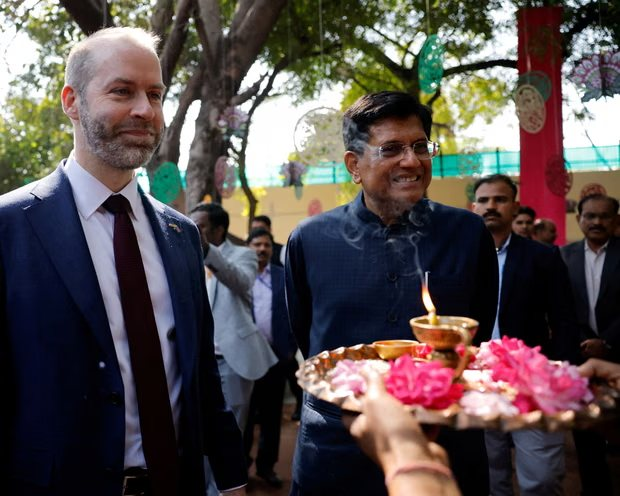Tough negotiations went on .... and not to forget ... Piyush Goyal entertaining British guests with 11 pm late night 'chai and kheer' in his house.
“Negotiating with India is not the same as negotiating, say, with Australia, or the USA, or Canada. It’s a relationship-based system, very much about who gets on with who and ensuring that you don’t insult anyone in any way,” said one senior UK official who has been closely involved in India-UK Free Trade Agreement talks.
"Landed in London.
This visit will go a long way in advancing the economic partnership between our nations. The focus will be on furthering prosperity, growth and boosting job creation for our people.
A strong India-UK friendship is essential for global progress." - PM Narendra Modi tweeted kickstarting his historic visit.
The Prime Minister's visit would finalise the much awaited India-UK Free Trade Agreement. It has economic and geo-strategic significance in more ways than one.
It is important for Britain as it will be a much-needed post-Brexit boost.
For India, it will show that the decades of protectionism are in the past.
Keir Starmer and Narendra Modi will sign the trade deal concluding three and a half years of negotiations and opening up trade between two countries for cars, whisky, clothing and food products.
Before his departure from Delhi, Modi said with UK the Comprehensive Strategic Partnership has achieved "significant momentum in the last few years".
In UK politics, the Labour Ministry takes pride for clinching the deal within 10 months of entering government, defying expectations – above all their own – about how quickly it could be done.
The negotiations were led by Jonathan Reynolds, the trade secretary, and his Indian counterpart, Commerce Minister Piyush Goyal.
Half a dozen UK officials and aides said the rapport between the pair and a focus on building trust and good relationships were critical to getting it over the line.
It is reported that the negotiations sometimes happened in creative ways. After Goyal told them he was a huge fan of Yes Minister, British negotiators brought him a handwritten note from Jonathan Lynn, one of the show’s co-creators.
But in overall perspective it was a key and challenging task for British diplomats in India – including the high commissioner, Lindy Cameron.
British trade commissioner, Harjinder Kang had to provide UK ministers and officials with something akin to relationship advice on dealing with their Indian counterparts.
There were moments of comedy, reported British media.
At one point after a difficult set of negotiations, UK and Indian officials let off steam by doing yoga in the corridor outside the room.
On another occasion, the British negotiators led by Kate Thornley were at the airport in Delhi about to fly home when they received a call from the Indian side saying they were prepared to make key concessions on food and drink.
A negotiator who had not yet gone through airport security turned on his heels to rush back to the negotiation room.
“You have moments where it’s almost collapsing, and you have moments where you think you’ve got it over the line,” a senior British official said.
“Until there’s ink on a piece of paper, it’s fluid.”


As they say, political signalling was crucial.
British Trade Secretary (equivalent to minister in India) Reynolds first met Piyush Goyal when Labour party was in opposition, while he and David Lammy were visiting Delhi in February 2024.
India and the UK were due to hold elections that year, with Modi widely expected to win a third term and Labour on course to end 14 years of Tory government.
The trip was a particularly sensitive one for Labour, which was working to mend relations with India after a nadir in 2019 when Jeremy Corbyn was perceived to have sided with Pakistan over Kashmir.
Lammy and Reynolds were having dinner with Indian investors and had not expected to meet Goyal, who like other ministers was occupied with the budget debate in parliament. But during dinner they got a message from Goyal inviting them to his home nearby for a nightcap.
Over 11 pm 'chai and kheer', Reynolds and Lammy made it clear that they would support the Conservative government if it finalised a trade deal with India – and did not forget to add that the Labour party if voted to power would pick up the negotiations after the election if it won.
In November, two Prime Ministers Starmer and Narendra Modi met on the margins of the G20 summit in Brazil and reiterated their ambition for a deal.
But, in the months that followed, there was a lull in negotiations which created some frustration on the Indian side, fuelling suspicions that it was not as much a priority for Labour as it had been for the Tories.
In truth, Reynolds’s team considered a trade deal with India to be a medium-term goal, one that was unlikely to materialise until later in the parliament. And instead of getting back around the negotiating table straight away, ministers spent several months combing through what had been already agreed under the Conservatives.
“We were going through it and bringing ministers of all departments up to speed,” said a senior UK official.
In February, a year after first meeting Goyal, Reynolds travelled to Delhi to formally restart negotiations. Progress in those talks significantly exceeded officials’ expectations – and crucially the two sides agreed not to reopen the aspects of the deal negotiated under the Tories.
Things started to fall into place at such a pace.....
A few weeks later Rachel Reeves, the chancellor, who has also been closely involved in the talks, hosted the Indian finance minister, Nirmala Sitharaman, in 11 Downing Street.
It may be pointed out that the bilateral trade between India and UK crossed $55 billion in 2023-24.
The UK is also the sixth largest investor in India, with a cumulative investment of $36 billion.
"Interestingly, India itself is a large source of Foreign Direct Investment in the UK, with a cumulative investment of close to $20 billion. There are close to a thousand Indian companies in the UK that provide employment to nearly 100,000 people and have a cumulative revenue of over $91 billion," says foreign secretary Vikram Misri.
Another important aspect in the ties is the the UK-India infrastructure financing bridge, which is coordinated between NITI Aayog on one side and the City of London on the UK side.
This mechanism works to avail UK expertise in mobilizing finance for green infrastructure projects and in the renewable energy sector in India.
ends









No comments:
Post a Comment